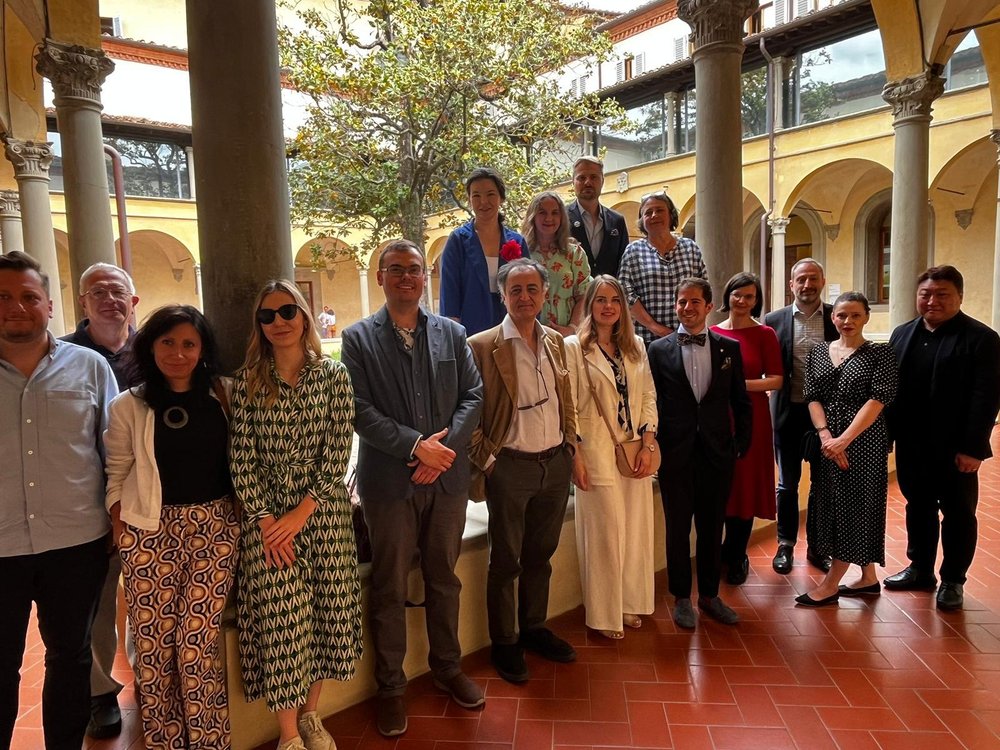
A joint workshop by MEMOCRACY and European University Institute (EUI) on memory laws in Russia and Ukraine
On 30 May 2024, a workshop, jointly organized by the Dutch MEMOCRACY team (Dr. Ulad Belavusau and Dr. Andrii Nekoliak) and Prof. Monika Báar (EUI), took place at the premises of the European University Institute (Florence, Italy).
This was the last of the MEMOCRACY consortium workshops dedicated to the country studies (with previous workshops covering Estonia, Germany, Hungary, Poland, Latvia, and Lithuania), this time co-organized by the History Department of the EUI and the Asser Institute, and dedicated to memory laws and policies of Russia and Ukraine.
The first panel of the workshop, chaired by Dr. Ulad Belavusau (Asser senior researcher in European law), focused on the presentation and critical discussion with scholars and practitioners in the field of the Study Report by Dr. Andrii Nekoliak (T.M.C. Asser postdoctoral researcher). His study report that will be finalized in the summer 2024, taking on board the recommendations received during the workshop, in particular, from the leading specialists on transitional justice, European law and memory politics, including Prof Adam Łazowski (University of Westminster, UK), Prof Buhm-Suk Baek (Kyung Hee University Law School, South Korea), Prof Nikolay Koposov (Georgia Tech, USA), Anastasiia Vorobiova (Polish Academy of Sciences, Poland).
In his presentation, Dr. Andrii Nekoliak unpacked the various legal measures that regulate the representation of the historical past, comparing the legal developments in Russia and Ukraine. In recent years, the topic of memory laws has been actively discussed in the comparative scholarship in the context of the legal bans on historical speech, proliferating in Central and Eastern Europe, since the 2010s. The diverse ways in which states approach the historical past as well as the compatibility of such legislation with international and European law, in particular with the European Convention on Human Rights, are often at stake.
Moreover, the ramifications of memory laws are profound internationally and domestically. Russia’s war in Ukraine spotlights the mobilization of historical memory for a military conflict. Vladimir Putin’s rationale for Russia’s invasion of Ukraine in February 2022 advanced a quasi-historical justification that denied the legitimacy of Ukraine’s statehood and a claim about denazification. Domestically alike, Russian memory laws bear a particularly repressive character.
In the second part of the workshop, a panel of the renowned scholars and experts discussed and contextualized Russia’s and Ukraine’s trajectories of legal regulation of historical memories further. Dr Tatiana Zhurzhenko (ZOiS, Germany) focused closely on Ukraine’s experiences with its De-communisation Laws of 2015. Dr Karolina Koziura (EUI) spoke about the first Ukraine’s punitive law, the 2006 Holodomor Law, in the context of the politics of memory in Ukraine. Prof Nikolay Koposov (Georgia Tech, USA) addressed the issue of Soviet Russia’s legislation on historical memory and how it has affected the developments in post-Soviet Russia since 1990s. In his panel remarks, Ilya Nuzov (International Federation for Human Rights, FIDH, France) addressed memory politics and the state of affairs in the Russian civil society since Russia has invaded Ukraine in February 2022.
Initially, when the MEMOCRACY project was designed in 2021 – that is before the fully-fledged Russian invasion in Ukraine – this workshop on memory laws in Ukraine and Russia, was planned to be held in Kyiv. For the obvious reasons, organizing it in Ukraine in spring 2024 would have been problematic. Therefore, the EUI was chosen as the leading European university, due to its international character and several relevant interdisciplinary units with leading senior and junior scholars in the field of law, history and memory politics.
The current workshop, consolidating lawyers, historians, political scientists and IR specialists (from the MEMOCRACY project, the EUI history and law departments, Robert Schuman Center, School of Transnational Governance, guests from Ghent University) was the final one in the sequence of MEMOCRACY workshops and will be proceeded with the MEMOCRACY concluding conference in Munich (Germany), in September 2024.
The study reports and policy briefs (including in national languages) from these workshops can be found here, including the study report of on Ukraine and Russia, that will be finalized during the summer 2024, taking on board the recommendations received during this workshop in Florence.